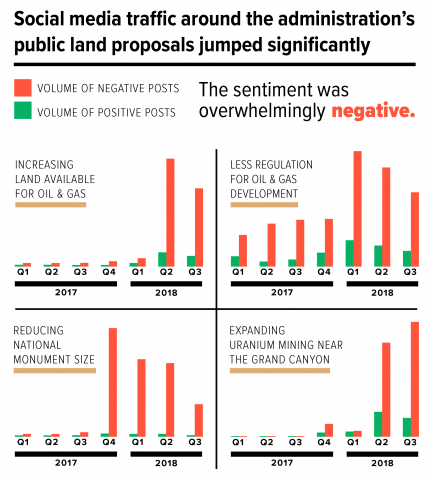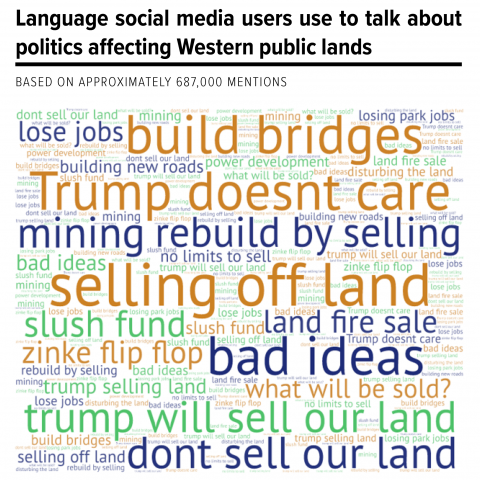

ConsumerAffairs.com analyzed on-site data to create a series of interactive maps displaying domestic moving trends in the United States, and we've found that the largest portion of prospective movers to Utah come from the state of California
Specifically, our data suggests that 32.0% of the moving pool to Utah is comprised of Californians.
Check it out here:
https://www.consumeraffairs.com/movers/whos-moving-to-the-west.html#utah
Here are some additional migration trends we found regarding Utah:
Similar to Utah as a whole, Salt Lake City gets the largest portion of its prospective movers, 22.6%, from California.
======================
DENVER—A first-of-its-kind social media analysis released today by the Center of Western Priorities shows key online conversations and activity around public lands in Mountain West swing states.
The Winning the West social media analysis—conducted in Arizona, Colorado, Montana, Nevada, and New Mexico—reveals how Westerners incorporate public lands into their everyday lifestyle, the newsworthy events that drive social media around public lands, and the way outdoor businesses drive conversations online.
From January 2016 to present, there were more than two million mentions from the five targeted Western states relating to public lands, with each quarter seeing a growth in the volume of conversation. Data suggests that of those two million mentions, approximately 66 percent of public lands conversations were geared toward the Trump administration and 34 percent of the conversations were geared toward recreational use of public lands through sharing visits to recreational areas and scenic photos, which were common on social media platforms like Facebook, Instagram, and Twitter.
The analysis found people in the Mountain West mentioned how they use public lands approximately one million times: hiking made up 34 percent of the conversation, camping was 24 percent, followed by mountain biking at 12 percent, off-roading at 10 percent, and the remaining 20 percent divided between fishing, hunting, and boating.
Conversations around development on public lands, like new drilling or mining, were almost always negative since the beginning of the Trump administration.
When online discussions around public lands turned political, most social media users focused on Trump administration proposals to remove protections, making public lands easier to develop. The online conversation around those proposals garnered nearly 687,000 mentions and was largely negative, according to the analysis.
The analysis found a recent spike in social media conversations on several public lands-related topics. Driven by Trump administration proposals, the number of conversations around increasing the amount of land available for oil and gas development, cutting regulations for drilling and mining operations, expanding uranium mining near the Grand Canyon, and reducing the size of national monuments jumped significantly. Reactions online were overwhelmingly negative.
“Westerners are turning to social media as a way to share their opposition to proposals that run counter to the region’s strong outdoor values,” said Jennifer Rokala, executive director of the Center for Western Priorities. “Rising volumes of online conversation may indicate the outsized role public lands issues could play in the outcome of elections in the Mountain West.”
Several large brands have gotten involved in the public lands conversation on social media through the use of influencers or their owned channels, according to the analysis. The increasingly active role of outdoor companies is heavily reflected in the sentiment results. Patagonia has been particularly successful in creating content in opposition to Trump administration public lands proposals, generating approximately 60,000 posts since 2016.
The net effect of its recent policies and actions leaves the Trump administration with a negative “social media” public approval rating in all five states on handling public lands issues.
“A hand-coded analysis of sentiment across publicly available social media conversations shows that, overall, the general public discusses government handling of public land in a negative way, which is directly linked to approval of the administration,” said Brian Gottlieb from Gottlieb Strategic Research which conducted the analysis. “The online conversation, by and large, concurs with the negative opinions of the Trump administration’s handling of public lands we found earlier this year in our polling.”
In addition to the social media analysis, the Center for Western Priorities conducted a Winning the West 2018 poll which showed the growing influence of the “Outdoor Voting Bloc” in Mountain West swing states. The updated WinningTheWest2018.org site, along with online issue ads running from July through October, is intended to educate candidates and campaigns about how important it is to show support for public lands and access to the outdoors, particularly among persuadable voters in Mountain West swing states.
The Winning the West social media analysis was conducted by Gottlieb Strategic Research. It identified two million mentions of publicly available social media dating back to January 2016 in five targeted states. The analysis was performed by developing multiple keyword topics, which were created using Boolean language terms, derivatives, and slang. The margin of error is less than 2 percent.
To speak with the Brian Gottlieb from Gottlieb Strategic Research or Jennifer Rokala from the Center for Western Priorities, contact Aaron Weiss at 720-279-0019 or aaron@westernpriorities.org.
###
The Center for Western Priorities is a conservation policy and advocacy organization focused on land and energy issues across the American West.
At USDA, we touch the life of every American every day, because last we checked, everyone has to eat. We provide programs and services to the farmers, ranchers, foresters, and producers who feed, fuel, and clothe this nation and the world. And we spend a lot of time traveling the country, hearing ideas and concerns from the people of American agriculture.
It’s true that not all wisdom resides in Washington, D.C. So we want you to get engaged, ask questions, and offer suggestions to improve what we do for our customers.
Join the conversation:
Also, in case you haven’t already, check out USDA’s Facebook, Twitter, and Instagram accounts for updates, resources, and important news you can use.
Please join us as we continue to fulfill our motto to “Do Right and Feed Everyone!”